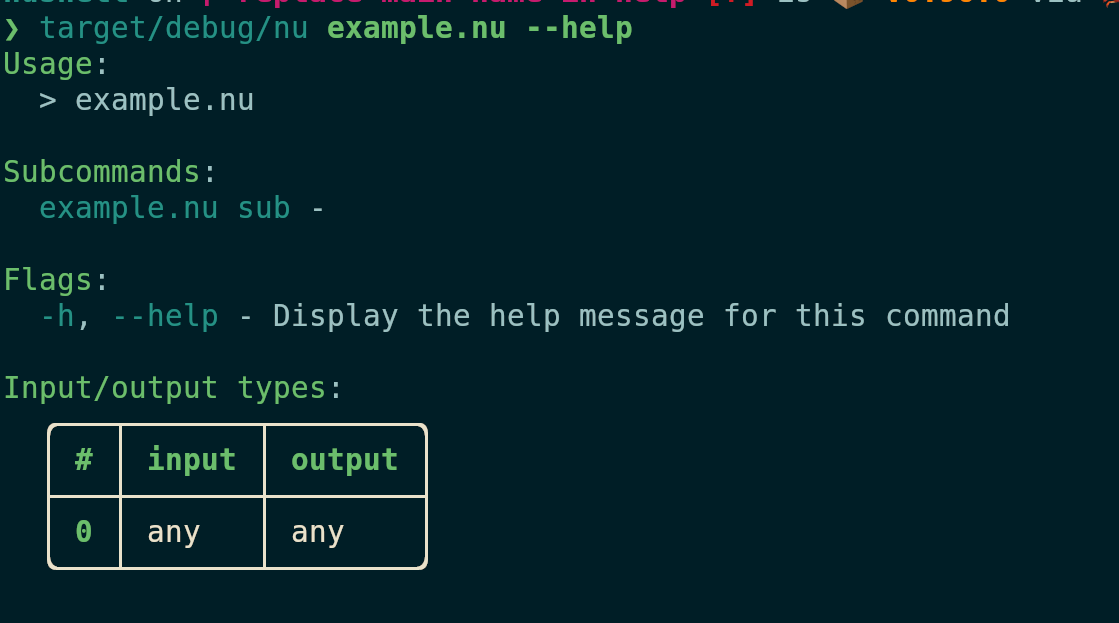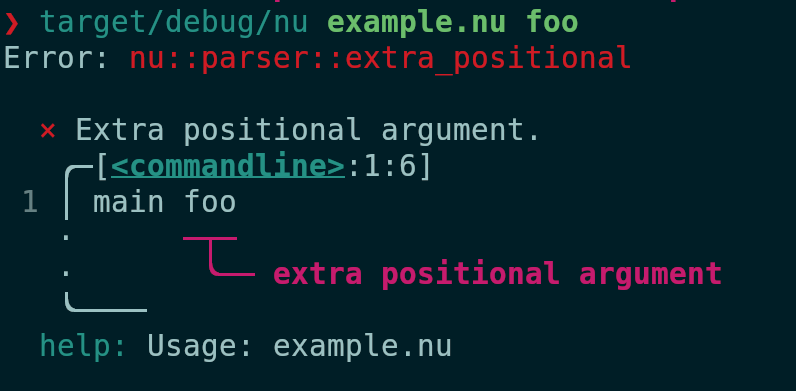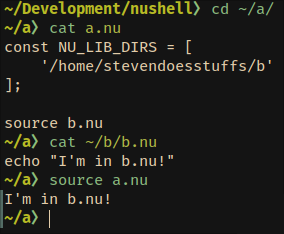# Description
<!--
Thank you for improving Nushell. Please, check our [contributing
guide](../CONTRIBUTING.md) and talk to the core team before making major
changes.
Description of your pull request goes here. **Provide examples and/or
screenshots** if your changes affect the user experience.
-->
Currently the parser and the documentation generation use the signature
of the command, which means that it doesn't pick up on the changed name
of the `main` block, and therefore shows the name of the command as
"main" and doesn't find the subcommands. This PR changes the
aforementioned places to use the block signature to fix these issues.
This closes#13397. Incidentally it also causes input/output types to be
shown in the help, which is kinda pointless for scripts since they don't
operate on structured data but maybe not worth the effort to remove.
# User-Facing Changes
<!-- List of all changes that impact the user experience here. This
helps us keep track of breaking changes. -->
```
# example.nu
export def main [] { help main }
export def 'main sub' [] { print 'sub' }
```
Before:


After:


# Tests
<!--
Don't forget to add tests that cover your changes.
Make sure you've run and fixed any issues with these commands:
- `cargo fmt --all -- --check` to check standard code formatting (`cargo
fmt --all` applies these changes)
- `cargo clippy --workspace -- -D warnings -D clippy::unwrap_used` to
check that you're using the standard code style
- `cargo test --workspace` to check that all tests pass (on Windows make
sure to [enable developer
mode](https://learn.microsoft.com/en-us/windows/apps/get-started/developer-mode-features-and-debugging))
- `cargo run -- -c "use toolkit.nu; toolkit test stdlib"` to run the
tests for the standard library
> **Note**
> from `nushell` you can also use the `toolkit` as follows
> ```bash
> use toolkit.nu # or use an `env_change` hook to activate it
automatically
> toolkit check pr
> ```
-->
Tests are still missing for the subcommands and the input/output types
---------
Co-authored-by: Stefan Holderbach <sholderbach@users.noreply.github.com>
# Description
Removes the `which-support` cargo feature and makes all of its
feature-gated code enabled by default in all builds. I'm not sure why
this one command is gated behind a feature. It seems to be a relic of
older code where we had features for what seems like every command.
# Description
Judiciously try to avoid allocations/clone by changing the signature of
functions
- **Don't pass str by value unnecessarily if only read**
- **Don't require a vec in `Sandbox::with_files`**
- **Remove unnecessary string clone**
- **Fixup unnecessary borrow**
- **Use `&str` in shape color instead**
- **Vec -> Slice**
- **Elide string clone**
- **Elide `Path` clone**
- **Take &str to elide clone in tests**
# User-Facing Changes
None
# Tests + Formatting
This touches many tests purely in changing from owned to borrowed/static
data
# Description
This is an attempt to isolate the unit tests from whatever might be in
the user's config. If the
user's config is broken in some way or incompatible with this version
(for example, especially if
there are plugins that aren't built for this version), tests can
spuriously fail.
This makes tests more reliably pass the same way they would on CI even
if the user has config, and
should also make them run faster.
I think this is _good enough_, but I still think we should have a
specific config dir env variable for nushell specifically (rather than
having to use `XDG_CONFIG_HOME`, which would mess with other things) and
then we can just have `nu-test-support` set that to a temporary dir
containing the shipped default config files.
# Tests + Formatting
- 🟢 `toolkit fmt`
- 🟢 `toolkit clippy`
- 🟢 `toolkit test`
- 🟢 `toolkit test stdlib`
# Description
I have `nu` set as my shell in my editor, which allows me to easily pipe
selections of text to things like `str pascal-case` or even more complex
string operation pipelines, which I find super handy. However, the only
annoying thing is that I pretty much always have to add `| print -n` at
the end, because `nu` adds a newline when it prints the resulting value.
This adds a `--no-newline` option to stop that from happening, and then
you don't need to pipe to `print -n` anymore, you can just have your
shell command for your editor contain that flag.
# User-Facing Changes
- Add `--no-newline` command line option
# Tests + Formatting
- 🟢 `toolkit fmt`
- 🟢 `toolkit clippy`
- 🟢 `toolkit test`
- 🟢 `toolkit test stdlib`
# Description
Some of the tests in `tests::shell` were using `sh` unnecessarily, and
had `#[cfg(not(windows))]` when they should be testable on Windows if
`sh` is not used.
I also found that they were using `.expect()` incorrectly, under the
assumption that that would check their output, when really an
`assert_eq!` on the output is needed to do that. So these tests weren't
even really working properly before.
# User-Facing Changes
None
# Tests + Formatting
- 🟢 `toolkit fmt`
- 🟢 `toolkit clippy`
- 🟢 `toolkit test`
- 🟢 `toolkit test stdlib`
I wondered why this test failed for me.
Turns out my config file is not compatible with current main, but the
error message was useless. I've added `--no-config-file`
# Description
Add a few tests to ensure that you can add subcommands to scripts. We've
supported this for a long time, though I'm not sure if anyone has
actually tried it. As we weren't testing the support, this PR adds a few
tests to ensure it stays working.
Example script subcommand:
```
def "main addten" [x: int] {
print ($x + 10)
}
```
then call it with:
```
> nu ./script.nu addten 5
```
# User-Facing Changes
<!-- List of all changes that impact the user experience here. This
helps us keep track of breaking changes. -->
# Tests + Formatting
<!--
Don't forget to add tests that cover your changes.
Make sure you've run and fixed any issues with these commands:
- `cargo fmt --all -- --check` to check standard code formatting (`cargo
fmt --all` applies these changes)
- `cargo clippy --workspace -- -D warnings -D clippy::unwrap_used -A
clippy::needless_collect -A clippy::result_large_err` to check that
you're using the standard code style
- `cargo test --workspace` to check that all tests pass
- `cargo run -- -c "use std testing; testing run-tests --path
crates/nu-std"` to run the tests for the standard library
> **Note**
> from `nushell` you can also use the `toolkit` as follows
> ```bash
> use toolkit.nu # or use an `env_change` hook to activate it
automatically
> toolkit check pr
> ```
-->
# After Submitting
<!-- If your PR had any user-facing changes, update [the
documentation](https://github.com/nushell/nushell.github.io) after the
PR is merged, if necessary. This will help us keep the docs up to date.
-->
<!--
if this PR closes one or more issues, you can automatically link the PR
with
them by using one of the [*linking
keywords*](https://docs.github.com/en/issues/tracking-your-work-with-issues/linking-a-pull-request-to-an-issue#linking-a-pull-request-to-an-issue-using-a-keyword),
e.g.
- this PR should close #xxxx
- fixes #xxxx
you can also mention related issues, PRs or discussions!
-->
# Description
<!--
Thank you for improving Nushell. Please, check our [contributing
guide](../CONTRIBUTING.md) and talk to the core team before making major
changes.
Description of your pull request goes here. **Provide examples and/or
screenshots** if your changes affect the user experience.
-->
This PR cleans up tests in the `tests/` directory by removing
unnecessary code.
Part of #8670.
- [x] const_/mod.rs
- [x] eval/mod.rs
- [x] hooks/mod.rs
- [x] modules/mod.rs
- [x] overlays/mod.rs
- [x] parsing/mod.rs
- [x] scope/mod.rs
- [x] shell/environment/env.rs
- [x] shell/environment/nu_env.rs
- [x] shell/mod.rs
- [x] shell/pipeline/commands/external.rs
- [x] shell/pipeline/commands/internal.rs
- [x] shell/pipeline/mod.rs
# User-Facing Changes
<!-- List of all changes that impact the user experience here. This
helps us keep track of breaking changes. -->
# Tests + Formatting
<!--
Don't forget to add tests that cover your changes.
Make sure you've run and fixed any issues with these commands:
- `cargo fmt --all -- --check` to check standard code formatting (`cargo
fmt --all` applies these changes)
- `cargo clippy --workspace -- -D warnings -D clippy::unwrap_used -A
clippy::needless_collect -A clippy::result_large_err` to check that
you're using the standard code style
- `cargo test --workspace` to check that all tests pass
- `cargo run -- crates/nu-std/tests/run.nu` to run the tests for the
standard library
> **Note**
> from `nushell` you can also use the `toolkit` as follows
> ```bash
> use toolkit.nu # or use an `env_change` hook to activate it
automatically
> toolkit check pr
> ```
-->
# After Submitting
<!-- If your PR had any user-facing changes, update [the
documentation](https://github.com/nushell/nushell.github.io) after the
PR is merged, if necessary. This will help us keep the docs up to date.
-->
# Description
For years, Nushell has used `let-env` to set a single environment
variable. As our work on scoping continued, we refined what it meant for
a variable to be in scope using `let` but never updated how `let-env`
would work. Instead, `let-env` confusingly created mutations to the
command's copy of `$env`.
So, to help fix the mental model and point people to the right way of
thinking about what changing the environment means, this PR removes
`let-env` to encourage people to think of it as updating the command's
environment variable via mutation.
Before:
```
let-env FOO = "BAR"
```
Now:
```
$env.FOO = "BAR"
```
It's also a good reminder that the environment owned by the command is
in the `$env` variable rather than global like it is in other shells.
# User-Facing Changes
BREAKING CHANGE BREAKING CHANGE
This completely removes `let-env FOO = "BAR"` so that we can focus on
`$env.FOO = "BAR"`.
# Tests + Formatting
<!--
Don't forget to add tests that cover your changes.
Make sure you've run and fixed any issues with these commands:
- `cargo fmt --all -- --check` to check standard code formatting (`cargo
fmt --all` applies these changes)
- `cargo clippy --workspace -- -D warnings -D clippy::unwrap_used -A
clippy::needless_collect -A clippy::result_large_err` to check that
you're using the standard code style
- `cargo test --workspace` to check that all tests pass
- `cargo run -- crates/nu-std/tests/run.nu` to run the tests for the
standard library
> **Note**
> from `nushell` you can also use the `toolkit` as follows
> ```bash
> use toolkit.nu # or use an `env_change` hook to activate it
automatically
> toolkit check pr
> ```
-->
# After / Before Submitting
integration scripts to update:
- ✔️
[starship](https://github.com/starship/starship/blob/master/src/init/starship.nu)
- ✔️
[virtualenv](https://github.com/pypa/virtualenv/blob/main/src/virtualenv/activation/nushell/activate.nu)
- ✔️
[atuin](https://github.com/ellie/atuin/blob/main/atuin/src/shell/atuin.nu)
(PR: https://github.com/ellie/atuin/pull/1080)
- ❌
[zoxide](https://github.com/ajeetdsouza/zoxide/blob/main/templates/nushell.txt)
(PR: https://github.com/ajeetdsouza/zoxide/pull/587)
- ✔️
[oh-my-posh](https://github.com/JanDeDobbeleer/oh-my-posh/blob/main/src/shell/scripts/omp.nu)
(pr: https://github.com/JanDeDobbeleer/oh-my-posh/pull/4011)
# Description
This PR is just a minor development improvement. While working on
another feature, I noticed that the root crate lists the super useful
`pretty_assertions` in the root crate but doesn't use it in most tests.
With this change `pretty_assertions::assert_eq!` is used instead of
`core::assert_eq!` for better diffs when debugging the tests.
I thought of adding the dependency to other crates but I decided not to
since I didn't want a huge disruptive PR :)
Reverts nushell/nushell#8310
In anticipation that we may want to revert this PR. I'm starting the
process because of this issue.
This stopped working
```
let-env NU_LIB_DIRS = [
($nu.config-path | path dirname | path join 'scripts')
'C:\Users\username\source\repos\forks\nu_scripts'
($nu.config-path | path dirname)
]
```
You have to do this now instead.
```
const NU_LIB_DIRS = [
'C:\Users\username\AppData\Roaming\nushell\scripts'
'C:\Users\username\source\repos\forks\nu_scripts'
'C:\Users\username\AppData\Roaming\nushell'
]
```
In talking with @kubouch, he was saying that the `let-env` version
should keep working. Hopefully it's a small change.
# Description
Allow NU_LIBS_DIR and friends to be const they can be updated within the
same parse pass. This will allow us to remove having multiple config
files eventually.
Small implementation detail: I've changed `call.parser_info` to a
hashmap with string keys, so the information can have names rather than
indices, and we don't have to worry too much about the order in which we
put things into it.
Closes https://github.com/nushell/nushell/issues/8422
# User-Facing Changes
In a single file, users can now do stuff like
```
const NU_LIBS_DIR = ['/some/path/here']
source script.nu
```
and the source statement will use the value of NU_LIBS_DIR declared the
line before.
Currently, if there is no `NU_LIBS_DIR` const, then we fallback to using
the value of the `NU_LIBS_DIR` env-var, so there are no breaking changes
(unless someone named a const NU_LIBS_DIR for some reason).

# Tests + Formatting
~~TODO: write tests~~ Done
# After Submitting
~~TODO: update docs~~ Will do when we update default_env.nu/merge
default_env.nu into default_config.nu.
Add two rows in `$nu`, `$nu.is-interactive` and `$nu.is-login`, which
are true when nu is run in interactive and login mode respectively.
The `-i` flag now behaves a bit more like that of bash's, where the any
provided command or file is run without REPL but in "interactive mode".
This should entail sourcing interactive-mode config files, but since we
are planning on overhauling the config system soon, I'm holding off on
that. For now, all `-i` does is set `$nu.is-interactive` to be true.
About testing, I can't seem to find where cli-args get tested, so I
haven't written any new tests for this. Also I don't think there are any
docs that need updating. However if I'm wrong please tell me.
* start working on source-env
* WIP
* Get most tests working, still one to go
* Fix file-relative paths; Report parser error
* Fix merge conflicts; Restore source as deprecated
* Tests: Use source-env; Remove redundant tests
* Fmt
* Respect hidden env vars
* Fix file-relative eval for source-env
* Add file-relative eval to "overlay use"
* Use FILE_PWD only in source-env and "overlay use"
* Ignore new tests for now
This will be another issue
* Throw an error if setting FILE_PWD manually
* Fix source-related test failures
* Fix nu-check to respect FILE_PWD
* Fix corrupted spans in source-env shell errors
* Fix up some references to old source
* Remove deprecation message
* Re-introduce deleted tests
Co-authored-by: kubouch <kubouch@gmail.com>
* fix#4161
println! and friends will panic on BrokenPipe. The solution is to use
writeln! instead, and ignore the error (or do we want to do something else?)
* test that nu doesn't panic in case of BrokenPipe error
* fixup! test that nu doesn't panic in case of BrokenPipe error
* make do_not_panic_if_broken_pipe only run on UNIX systems
* Resolve rebase artifacts
* Remove leftover dependencies on removed feature
* Remove unnecessary 'pub'
* Start taking notes and fooling around
* Split canonicalize to two versions; Add TODOs
One that takes `relative_to` and one that doesn't.
More TODO notes.
* Merge absolutize to and rename resolve_dots
* Add custom absolutize fn and use it in path expand
* Convert a couple of dunce::canonicalize to ours
* Update nu-path description
* Replace all canonicalize with nu-path version
* Remove leftover dunce dependencies
* Fix broken autocd with trailing slash
Trailing slash is preserved *only* in paths that do not contain "." or
"..". This should be fixed in the future to cover all paths but for now
it at least covers basic cases.
* Use dunce::canonicalize for canonicalizing
* Alow cd recovery from non-existent cwd
* Disable removed canonicalize functionality tests
Remove unused import
* Break down nu-path into separate modules
* Remove unused public imports
* Remove abundant cow mapping
* Fix clippy warning
* Reformulate old canonicalize tests to expand_path
They wouldn't work with the new canonicalize.
* Canonicalize also ~ and ndots; Unify path joining
Also, add doc comments in nu_path::expansions.
* Add comment
* Avoid expanding ndots if path is not valid UTF-8
With this change, no lossy path->string conversion should happen in the
nu-path crate.
* Fmt
* Slight expand_tilde refactor; Add doc comments
* Start nu-path integration tests
* Add tests TODO
* Fix docstring typo
* Fix some doc strings
* Add README for nu-path crate
* Add a couple of canonicalize tests
* Add nu-path integration tests
* Add trim trailing slashes tests
* Update nu-path dependency
* Remove unused import
* Regenerate lockfile
The autoenv logic mutates environment variables in the running session as
it operates and decides what to do for trusted directories containing `.nu-env`
files. Few of the ways to interact with it were all in a single test function.
We separate out all the ways that were done in the single test function to document
it better. This will greatly help once we start refactoring our way out from setting
environment variables this way to just setting them to `Scope`.
This is part of an on-going effort to keep variables (`PATH` and `ENV`)
in our `Scope` and rely on it for everything related to variables.
We expect to move away from setting (`std::*`) envrironment variables in the current
running process. This is non-trivial since we need to handle cases from vars
coming in from the outside world, prioritize, and also compare to the ones
we have both stored in memory and in configuration files.
Also to send out our in-memory (in `Scope`) variables properly to external
programs once we no longer rely on `std::env` vars from the running process.
This commit changes the way we shell out externals when using the `"$it"` argument. Also pipes per row to an external's stdin if no `"$it"` argument is present for external commands.
Further separation of logic (preparing the external's command arguments, getting the data for piping, emitting values, spawning processes) will give us a better idea for lower level details regarding external commands until we can find the right abstractions for making them more generic and unify within the pipeline calling logic of Nu internal's and external's.
* Clippy fixes
* Finish converting to use clippy
* fix warnings in new master
* fix windows
* fix windows
Co-authored-by: Artem Vorotnikov <artem@vorotnikov.me>